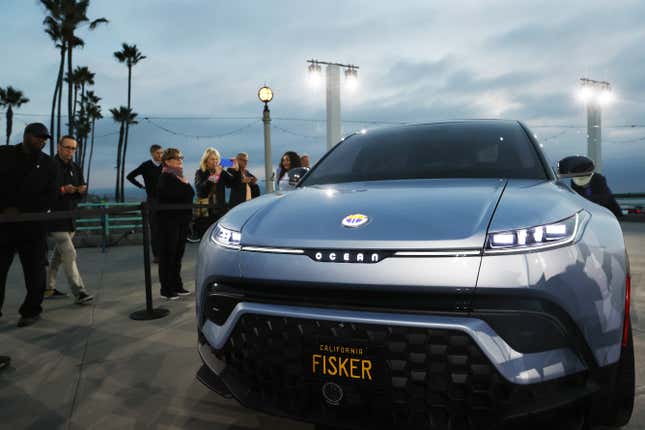
In This Story
Electric vehicle startup Fisker has been in trouble for years, ever since it first began delivering its flagship Ocean SUV.
Ocean’s many problems — and subsequent headache for owners — won’t be stopped by filing for Chapter 11 bankruptcy protection, according to new documents posted on the National Highway Transportation Safety Administration’s (NHTSA) website. Fisker is recalling 8,402 Oceans because of outer door handles that may get stuck, preventing customers from getting into or leaving their vehicles. The company is also recalling 3,806 vehicles in Europe and 513 in Canada.
The company said it will inspect the door handles and, if necessary, replace affected handles. Dealers have already been notified of the issue, with notices to owners planned for delivery at the end of August.
It’s just the latest issue affecting the Ocean, which has been a mess since it launched to controversies and, often, bad reviews. The recall is Fisker’s third of the month over the Ocean, which is its only product on the market.
The SUV has also been the source of more than 100 complaints filed with U.S. regulators, with owners reporting their vehicles suddenly losing power and seeing their cars’ front hoods flying up when driving at high speeds. The NHTSA has opened four inquiries into issues related to the Ocean, which had once been thought of as a potential rival to Tesla’s best-selling Model Y.
Meanwhile, with Fisker possibly closing its doors for good, owners are worried about how to get help for their vehicles. Some customers have even formed their own nonprofit — the Fisker Owners Association — to advocate for ensuring continued access to services and, more importantly, parts.
Although Fisker is exploring options to continue with reduced operations, the firm only has permission to use its cash through June 28. In court papers filed earlier this month, Fisker said it has between $500 million and $1 billion in assets, with as much as $500 million in liabilities.
Fisker is the second company started by Henrik Fisker to end up in bankruptcy. His Fisker Automotive startup filed for bankruptcy in 2013 after a roughly six-year run that saw it produce the Fisker Karma, one of the world’s first production luxury plug-in hybrid EVs. But the startup repeatedly missed production deadlines, skipped federal loan payments, and suffered from a series of management issues, leading to its collapse.